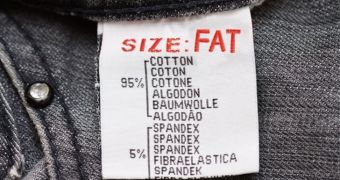Normally, when people go shopping, they expect to find clothes in sizes small, medium, large and extra large, but a Japanese clothing company is labeling its products differently, using words that might actually offend some customers and make their shopping experience unpleasant.
Clothing brand Fatyo, which offers mainly menswear, has reportedly decided to use less conventional designations for its garments, retailing items in sizes twitch, skinny, fat and jumbo, instead of the standard numerical sizes.
Apparently, using alternative sizing labels is not entirely uncommon in Japan, and the company in question even explains that they aren't using the terms as derogatory descriptions, saying that their brand is supposed to make fat “cool.”
However, I am sure people don't really appreciate being called fat, much less having clothes to remind them of their bodies imperfections every time they wear them. And if you thought finding a “fat” size item in a store was bad, find out that there is also a “jumbo.”
At the opposite end of the sizing scale, Fatyo offers garments in sizes “twitch” and “skinny,” which can't be considered too complimentary either.
Yahoo Shine comes with an interesting theory, trying to explain why the company chose this type of commercial sizing. They suggest that maybe the tag is intended to remind buyers to keep their weight down, adding that in 2009, Japanese lawmakers even established a maximum waistline size for people aged 40 and over, due to the alarming rates of obesity in the country.
Even to this day, employees undergo yearly checkups and those who don’t meet the waistline requirements are sent to health counseling.
Others have said that it might be just a marketing strategy and that the brand might be trying to attract interest and public attention with the strange labeling choices. But either way, calling your customers fat is utterly rude, regardless of the purpose.
I totally understand that the company wanted to incorporate its personal, customized sizes with more descriptive labels, but I'm sure they could have come up with other, less insulting words for that. With Fatyo's sizes, if you’re not feeling great about your body, shopping for clothes could be very demoralizing and could affect your self-esteem.
What do you think about this Japanese company's sizing choices? Would you buy clothes from a brand that calls its potential customers “fat”? Leave your opinion in the comment box below.

 14 DAY TRIAL //
14 DAY TRIAL //